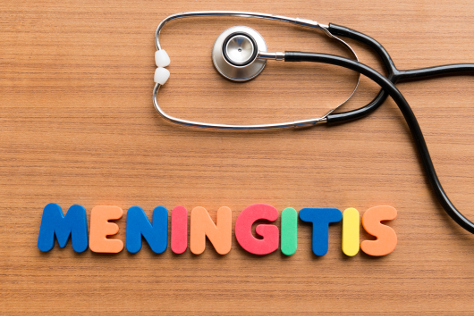What is Meningitis?
Bacterial Meningitis and meningococcal septicaemia can be deadly diseases. If not detected within hours, these diseases can cause lots of complications and may even be fatal. Early diagnosis and treatment is vital.
Meningitis is inflammation of the meninges, the protective membranes that protect the brain and spinal cord; meningococcal septicaemia is a bacterial infection of the blood that can develop as a result of the disease. Septicaemia can also occur on its own without meningitis and is a very dangerous illness in itself.

Meningitis can be either viral or bacterial. The most common bacterial type is meningococcal meningitis. Complications most often arise from bacterial meningitis, and include hearing loss, damage to nerves and collections of fluid on or in the brain.
Viral meningitis is more common in the summertime and is usually less severe than bacterial meningitis. Most patients usually make a full recovery, though it is still a very unpleasant illness.
Meningococcal meningitis can be life-threatening and may cause complications in blood flow to the limbs which in the worst cases may result in amputation or removal of damaged tissue.
Vaccines offer excellent protection against some types of meningitis and septicaemia, but they can't prevent all strains from occurring.
What are the symptoms of Meningitis?
Symptoms can differ in babies and older children. In a baby or toddler you may notice:
- a pin-prick rash that doesn't disappear when pressed with a tumbler
- a bulging or stretched fontanelle (soft spot)
- fever (temperature of 38°C or above)
- refusal to feed
- vomiting
- excessive drowsiness
- stiff body with jerky movements
- floppy limbs and general flopiness
- convulsions (fits)
- unusual crying or a high-pitched, moaning cry
- unresponsiveness
- general irritability
- rapid or obstructed breathing
- a vacant, staring expression
- blotchy, pale or blue-tinged skin
- cold hands and feet
- bruise marks
- diarrhoea
In an older child, teenager or adult, look for:
- a pin-prick rash that doesn't disappear when pressed with a tumbler
- fever (temperature of 38°C or above)
- cold hands and feet
- vomiting
- sensitivity to light
- headache
- confusion
- stiff neck
- pale, blotchy skin
- excessive drowsiness
Not everyone develops the tell-tale rash, and if it does appear, it usually comes after other symptoms. It's a sign of septicaemia, so it's vital you take your baby or child to the doctor immediately or call 999 if he shows any combination of the above symptoms. Don't wait until a rash appears, as early treatment is essential and can make a lot of difference to the outcome.
Diagnosis is made by blood tests and a procedure known as a lumbar puncture, where a sample of spinal fluid is extracted for analysis.
What are the treatments and remedies of Meningitis?
Ultimately, treatment depends on the type of meningitis, but intravenous antibiotics will be given to the patient immediately, rather than waiting for test results, and will be continued if tests confirm it's bacterial meningitis.
Patients with severe symptoms may also be given:
- oxygen
- intravenous fluids (delivered through a vein)
- medication to help reduce swelling around the brain
If the antibiotics are effective, most patients will start to improve after a day or so, but full recovery may takes weeks or months. Unresponsive or seriously ill patients will almost always need to be looked after in intensive care.
This guide
The information in this Bounty A-Z of Family Health is not a substitute for an examination, diagnosis or treatment by a doctor, midwife, health visitor or any other qualified health professional. If in doubt, always speak to a doctor.
Bounty will not be held responsible or liable for any injury, loss, damage, or illness, however this occurs or appears, after using the information given on this website and in particular the A-Z of Family Health.
Further help
For health advice and information 24 hours a day, 365 days a year, the NHS offers call and web services. You can also visit NHS websites for services, health information and health news at nhs.uk